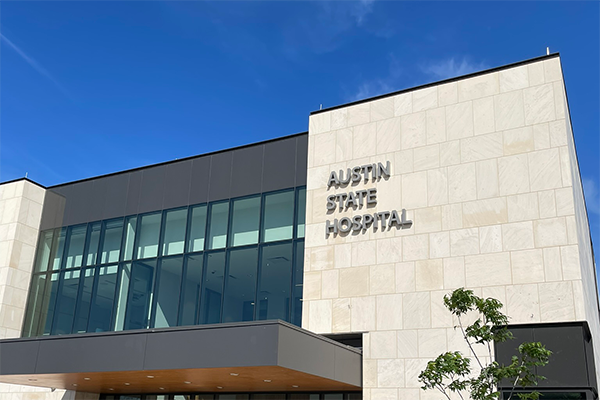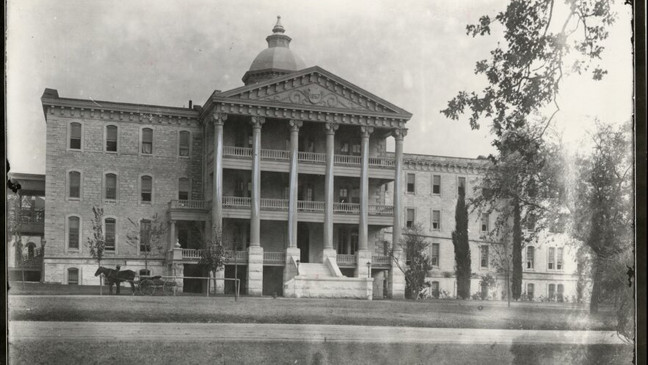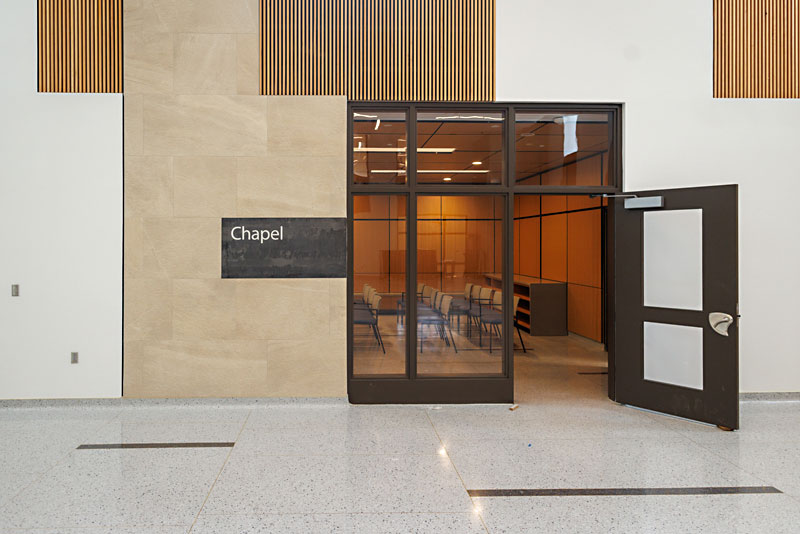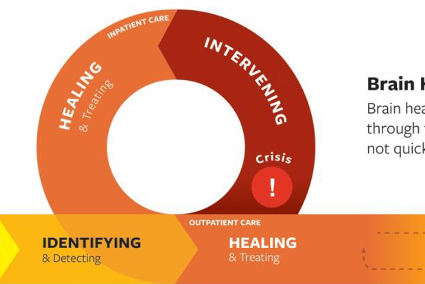2024 Impact Report
Austin State Hospital Reopening: The First Step in Building a Continuum of Care
After several years of planning, the new Austin State Hospital (ASH) facility opened its doors in 2024 to Texans needing care during mental health crises. The reopening marked a major milestone in the ASH Brain Health System Redesign plan (Redesign). Initiated in 2018 by the Texas Health and Human Services in partnership with The University of Texas at Austin’s Dell Medical School (Dell Med), the Redesign’s top priority was replacing the outmoded state hospital, established as the State Lunatic Asylum in 1856, with a modern mental health care facility.

Establishment of the "State Lunatic Asylum"
More than 100 organizations and individuals participated in the multiyear planning process. They represented mental health practitioners and advocates, educational institutions, law enforcement and judiciary systems, medical facilities, historians and archivists, community-based non-profit organizations, policymakers, and philanthropic foundations, including the Hogg Foundation for Mental Health. In keeping with a core principle of “people first”, individuals with lived mental health experience also participated as essential stakeholders.
Number of organizations and individuals that participated in the ASH Brain Health System Redesign planning process
“Best practices in mental health care are most effectively developed with active engagement of people who receive and deliver mental health care services,” says Dr. Stephen Strakowski, associate vice president of regional mental health and professor of psychiatry and behavioral sciences at Dell Medical School. “This ‘people first’ approach helps identify gaps and barriers of which administrators are often not aware. Essentially, a person-centered design process is, by definition, a best practice.”
At nearly 400,000 square feet, the hospital features 240 single-person rooms designed to balance comfort, privacy, and security; abundant natural lighting; open-air courtyards; a gym; an art studio; a chapel; and a shopping area. It also includes environmental design features to centralize treatment, reduce the risk of violence, and improve functional efficiency.
Number of single-person rooms in new ASH facility
“The architects specifically approached the building design based on what has been shown, through studies, to be best for people being served,” says Dr. Strakowski. “There is clear support for well-lit, individual spaces that give people autonomy and, frankly, a feeling they are not simply in jail.”
Continuum of Care
The completion of the new ASH facility is a truly significant achievement. However, it’s only the first step on a path that leads to the Redesign’s long-term goal: establishing an accessible and integrated system of comprehensive mental health care for all Texans.
Often described as a “continuum of care,” an integrated system includes much more than new hospital buildings. It also aims to be responsive at every level of mental health care need, providing services before, during, and after mental health crises.
“A continuum of care means more than hospital capacity,” says Dr. Octavio N. Martinez, Jr., executive director of the Hogg Foundation. “It means increased access to outpatient care to assist in prevention and eliminate care deserts. It means enhanced crisis outreach with joint law enforcement and clinical response teams. It means opportunities for reintegration into the community once someone is discharged from the hospital.”
The Hogg Foundation’s support for developing a statewide continuum of care is not surprising. Indeed, it aligns well with our strategic focus on supporting community environments that promote mental health and well-being in everyday life. It also fits squarely within our long history of advocating for reform in the state’s mental health care system.
Advocacy and Reform
“Much of the Hogg Foundation’s early advocacy centered around disseminating modern mental health concepts to all Texans by funding seminars, academic studies, and expert speakers who gave public lectures across the state,” says Elizabeth Stauber, archivist and records manager at the Hogg Foundation. “The foundation also worked with state officials and agencies to improve training for hospital staffers and formed strategic partnerships with other mental health organizations such as the Texas Society for Mental Hygiene and The Texas State Board of Control.”
Journalistic exposes, documentary films, and publications produced by the foundation in the 1940’s and 50’s brought much-needed attention to the poor living and working conditions at state hospitals. And our strong support for state-level policy reform contributed to the passing of the landmark 1957 Texas Mental Health Code, the first legislated statute that defined the state’s responsibility for mental health services and established patients’ rights to visitation, religious freedom, communication, confidentiality of their clinical records, and a right to release.
Hogg Foundation releases a 30-minute documentary, In a Strange Land, as part of a larger campaign to reform and modernize the state hospital system.
Moving Forward
Having the new Austin State Hospital up and running is a milestone achievement for the Redesign. More remains to be done, however. The most recent Redesign Report, released in 2023, outlines five recommendations for moving forward: strengthening academic partnerships, raising employee compensation, building a continuum of housing, expanding peer and family services, and sharing the history of ASH.

“Texas has made major investments in mental health care for which it is to be commended,” says Dr. Strakowski. “For good reasons, much of the focus has been on acute and crisis care. However, the vast majority of service needs are in long-term subacute, chronic, maintenance, rehabilitative, and supportive care. Texas, like many states, has many significant gaps in these components of the mental health care continuum. Increasing awareness of and then filling these gaps remains a major goal of the Redesign.”
While the Redesign’s work on filling these gaps has temporarily slowed due to leadership changes at both Dell Med and HHSC, the Hogg Foundation remains as committed as ever to promoting mental health beyond the walls of health clinics and integrating it into everyday settings such as schools, workplaces, and faith-based organizations.
“My hope is that the Hogg Foundation will continue to provide input, weigh in with its expertise, and provide support as work progresses on building a full continuum of care for all people in Texas,” says Dr. Martinez.





